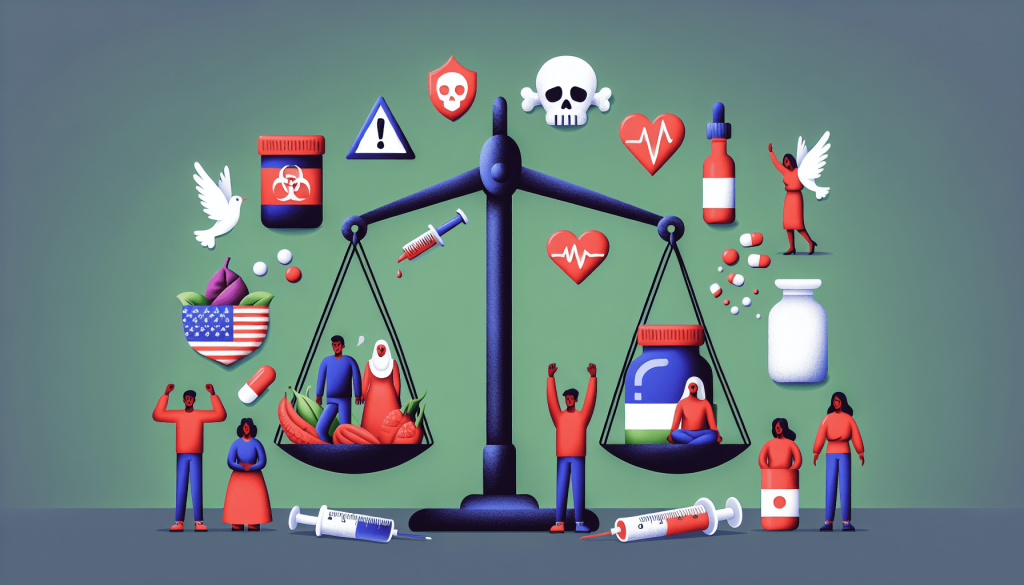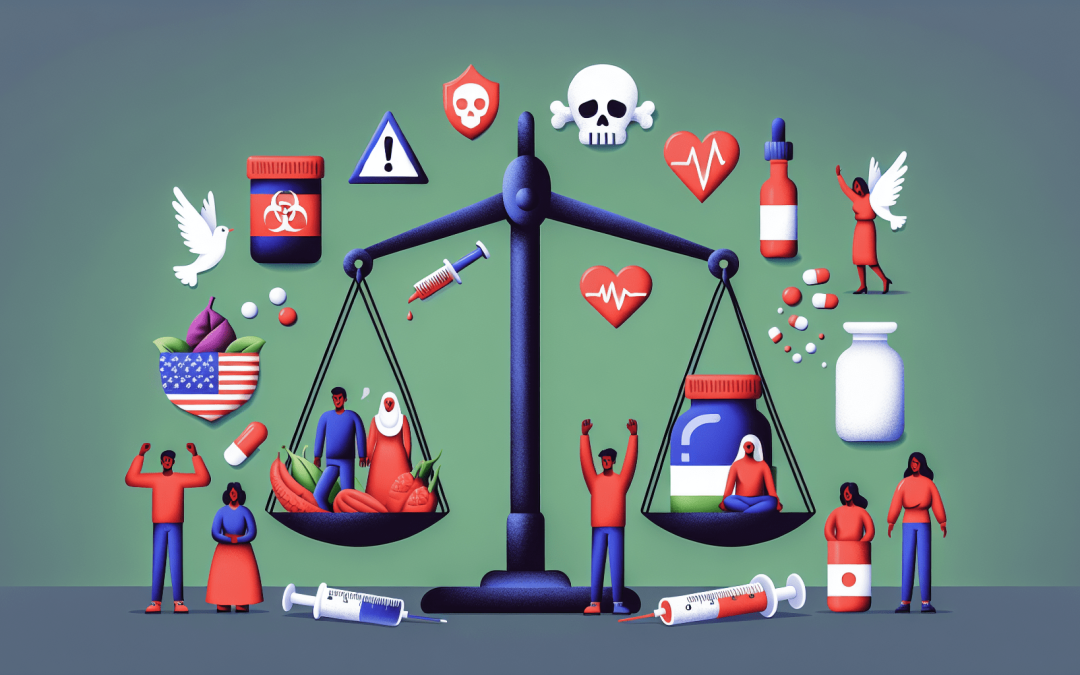In the quest for a healthier lifestyle, detox diets have become increasingly popular. However, it’s important to understand the potential risks that come along with these trendy cleanses. Your body actually has its own natural detoxification processes, so subjecting yourself to juice cleanses or restrictive eating may do more harm than good. The liver, kidneys, skin, and lungs are all organs that naturally detoxify the body. Instead of relying on extreme diets, focus on making simple, sustainable changes to your lifestyle. Taking care of your skin, consuming prebiotics, eating anti-inflammatory foods, getting enough sleep, exercising regularly, staying hydrated, and reducing alcohol intake are all ways to support your body’s natural detoxification processes. It’s crucial to consult with a healthcare provider before attempting any detox or cleanse. Remember, detoxes are not necessary, but implementing healthy lifestyle choices can support your overall health and natural detoxification processes.
Definition of Detox Diets
Explanation of detox diets
Detox diets are dietary plans that claim to rid the body of harmful toxins and promote overall health and well-being. These diets typically involve short-term changes in eating patterns, such as fasting, consuming solely juices, or restricting certain food groups. Proponents of detox diets argue that they can help cleanse the body and aid in weight loss.
Types of detox diets
There are several types of detox diets, each with its own set of guidelines and restrictions. Some common types include juice cleanses, water fasting, vegan or vegetarian diets, and elimination diets. Juice cleanses involve consuming only freshly pressed juices for a certain period, while water fasting entails abstaining from all food and only drinking water. Vegan or vegetarian detox diets focus on plant-based foods, while elimination diets involve temporarily avoiding certain foods or food groups to identify potential intolerances or allergies.
Detoxification Process in the Body
Explanation of body’s natural detoxification process
The human body has a natural and sophisticated detoxification process that is constantly at work, regardless of any dietary changes. This process involves the liver, kidneys, skin, and lungs working together to eliminate waste products, toxins, and other harmful substances from the body. The liver plays a central role in detoxification by breaking down harmful compounds and making them more water-soluble for excretion. The kidneys filter waste products from the blood and excrete them through urine, while the skin eliminates toxins through sweat. The lungs also aid in detoxification by removing carbon dioxide and other gases during respiration.
Role of liver, kidneys, skin, and lungs in detoxification
The liver is often referred to as the body’s primary detoxification organ. It metabolizes drugs, alcohol, and harmful substances to make them less harmful and facilitates their elimination from the body. The kidneys filter the blood, removing waste products and excess water to create urine. The skin, as the largest organ of the body, eliminates toxins through sweat, and the lungs remove waste gases during respiration. Together, these organs work in harmony to maintain the body’s natural detoxification process.

Effectiveness of Detox Diets
Limited evidence on effectiveness for weight loss
While detox diets are often marketed as weight loss solutions, there is limited scientific evidence to support their effectiveness in long-term weight loss. Most weight loss experienced during detox diets is often attributed to water loss and the restriction of calorie intake. However, once the diet is discontinued, the weight tends to return. Sustainable weight loss is best achieved through long-term lifestyle changes, such as a balanced diet and regular physical activity.
Scientific studies on detox diets
The scientific literature on detox diets is scarce, and existing studies often lack robust methodology and sample sizes. This makes it challenging to draw definitive conclusions on their efficacy and health benefits. Some studies suggest that certain detox diets may lead to short-term weight loss and improvements in certain health markers, such as insulin sensitivity. However, these results are often temporary and not sustainable in the long run.
Expert opinions on detox diets
Experts in the fields of nutrition and medicine generally express caution when it comes to detox diets. They emphasize that the body’s organs already have natural detoxification mechanisms in place and that there is no need for additional interventions. Many experts argue that focusing on overall healthy lifestyle choices, such as consuming a nourishing diet, staying hydrated, exercising regularly, and getting enough sleep, can support the body’s natural detox processes better than short-term detox diets.
Potential Risks of Detox Diets
Dehydration
One potential risk associated with detox diets is dehydration. Many detox diets involve significant fluid restrictions or rely heavily on diuretic beverages, such as herbal teas or detoxifying drinks. These practices can lead to increased fluid loss and result in dehydration if adequate fluid intake is not maintained. Dehydration can cause symptoms such as fatigue, dizziness, dry skin, and headaches. It is important to prioritize hydration during a detox diet to avoid these complications.
Nutrient deficiencies
Another concern with detox diets is the potential for nutrient deficiencies. Restricting certain food groups or drastically reducing calorie intake can lead to inadequate nutrient intake. Essential vitamins, minerals, and macronutrients may be lacking, which can have adverse effects on overall health and well-being. Long-term nutrient deficiencies can lead to weakened immune function, decreased energy levels, impaired cognitive function, and other health complications. It is essential to ensure a well-balanced nutrient intake during any dietary changes.
Gastrointestinal issues
Detox diets that involve significant dietary changes can also cause gastrointestinal issues. Sudden changes in dietary fiber intake, such as increasing or decreasing fiber consumption, can lead to digestive discomfort, bloating, constipation, or diarrhea. Elimination diets, which involve avoiding certain foods to identify sensitivities, can also cause gastrointestinal symptoms when the eliminated foods are reintroduced. It is important to be mindful of these potential issues and seek guidance from a healthcare provider if experiencing persistent gastrointestinal discomfort during a detox diet.
Impact on mental health
Detox diets may also have an impact on mental health. Drastic changes in eating patterns, restriction of certain foods, and the mental focus on “clean” eating can sometimes lead to psychological distress. Feelings of guilt, anxiety, and obsession surrounding food choices may arise, potentially leading to disordered eating patterns or negative body image. Practicing self-care, seeking support from loved ones, and maintaining a positive mindset are vital for preserving mental well-being during a cleanse.

Dehydration
Explanation of dehydration as a risk
Dehydration is a significant risk associated with detox diets, particularly those involving fluid restriction or diuretic beverages. These practices can result in increased fluid loss through urine, sweat, and respiration, leading to an imbalance in the body’s fluid levels. Without adequate hydration, various physiological processes can be compromised, affecting overall health and well-being.
Symptoms of dehydration
The symptoms of dehydration can vary in severity but often include thirst, dry mouth, fatigue, dizziness, lightheadedness, decreased urine output, dark-colored urine, dry skin, and headaches. In severe cases, dehydration can lead to confusion, rapid heartbeat, low blood pressure, and even fainting. Recognizing these symptoms and addressing dehydration promptly is crucial to avoid complications.
Importance of staying hydrated during detox diets
To mitigate the risk of dehydration during a detox diet, it is essential to prioritize proper hydration. This can be achieved by consuming an adequate amount of fluids throughout the day, aiming for a minimum of eight glasses of water daily. Including water-rich foods like fruits and vegetables can also contribute to hydration. It is important to listen to your body’s thirst signals and drink when you are feeling thirsty. Adequate hydration supports the body’s natural detoxification processes and helps maintain overall health.
Nutrient Deficiencies
Explanation of potential nutrient deficiencies
Detox diets, particularly those that heavily restrict food groups or calorie intake, can result in potential nutrient deficiencies. By eliminating certain foods or consuming a limited variety of foods, essential vitamins, minerals, and macronutrients may be lacking in the diet, impairing overall health and well-being.
Commonly lacking nutrients during detox diets
Some nutrients that may be lacking during detox diets include protein, iron, calcium, omega-3 fatty acids, and vitamins B12 and D. Protein is essential for tissue repair and maintenance, iron is crucial for red blood cell production, calcium is necessary for strong bones and teeth, omega-3 fatty acids support heart health, and vitamins B12 and D play vital roles in overall health and wellness. It is crucial to ensure a balanced nutrient intake during a detox diet to prevent deficiencies.
Long-term effects of nutrient deficiencies
Prolonged nutrient deficiencies can have detrimental effects on a person’s health. Inadequate protein intake can lead to muscle wasting, weakened immune function, and impaired hormone production. Iron deficiency can cause anemia and fatigue, while calcium deficiency can increase the risk of osteoporosis and bone fractures. Omega-3 fatty acid deficiencies have been linked to poor cardiovascular health, and low levels of vitamins B12 and D can result in energy depletion, mood disturbances, and weakened immune function. Paying attention to nutrient intake during a detox diet is crucial for maintaining overall health.

Gastrointestinal Issues
Explanation of gastrointestinal issues during detox diets
Detox diets can sometimes lead to gastrointestinal issues due to sudden dietary changes or the introduction of new foods. These changes can disrupt the balance of the gut microbiota and affect digestion and bowel movements, resulting in digestive discomfort and other gastrointestinal symptoms.
Common symptoms of gastrointestinal problems
Common symptoms of gastrointestinal issues during a detox diet include bloating, gas, abdominal pain, diarrhea, and constipation. These symptoms can be caused by changes in dietary fiber intake, inadequate fluid consumption, or food intolerances. It is important to listen to your body and address any persistent gastrointestinal symptoms during a detox diet.
Prevention and management of gastrointestinal issues
To prevent and manage gastrointestinal issues during a detox diet, it is important to make gradual dietary changes instead of sudden, extreme shifts. Gradually increasing fiber intake can help the digestive system adapt and minimize discomfort. Adequate fluid intake is also crucial for maintaining regular bowel movements and preventing constipation. If symptoms persist or become severe, it is recommended to consult with a healthcare provider for proper evaluation and guidance.
Impact on Mental Health
Effects of detox diets on mental health
Detox diets can sometimes have an impact on mental health due to the restrictive nature of the diets and the focus on “clean” eating. The strict rules and limitations surrounding food choices can lead to feelings of guilt, anxiety, and obsession. This can contribute to negative body image, disordered eating patterns, and impaired mental well-being.
Potential risks of psychological distress
Engaging in a detox diet can increase the risk of psychological distress, particularly for individuals with a history of disordered eating or body image concerns. The emphasis on restriction and the categorization of foods as “good” or “bad” can trigger negative thoughts and behaviors surrounding food. This can lead to anxiety, depression, obsessive thoughts, and a strained relationship with food and body image.
Tips for maintaining mental well-being during a cleanse
To maintain mental well-being during a detox diet, it is important to approach dietary changes with a balanced mindset. Focus on nourishing the body with whole, nutritious foods rather than viewing certain foods as “off-limits” or “dirty.” Practice self-compassion and gratitude for the body’s natural detoxification processes. Engage in stress-reducing activities such as meditation, yoga, or engaging in hobbies to promote overall mental well-being.

Consulting with Healthcare Provider
Importance of consulting with a healthcare provider
Before embarking on any detox diet or cleanse, it is crucial to consult with a healthcare provider. They can evaluate an individual’s overall health status, medical history, and specific dietary needs to ensure that a detox program is safe and suitable. Healthcare providers can also provide guidance and support throughout the process, addressing any potential risks or contraindications.
Health risks and contraindications
Detox diets may not be suitable for everyone and can pose health risks, especially for individuals with certain medical conditions or nutritional needs. People with diabetes, kidney disease, liver disease, or a history of disordered eating should exercise caution or avoid detox diets altogether. Pregnant or breastfeeding individuals should also consult with their healthcare provider before making any significant dietary changes.
Guidance on choosing a safe and suitable detox program
A healthcare provider can offer guidance on choosing a detox program that is safe and suitable for an individual’s specific needs. They can provide recommendations on the duration of the detox, the types of foods or beverages to include or avoid, and any necessary modifications to accommodate underlying health conditions or nutritional requirements. A customized approach to detoxification can help ensure the best possible outcomes while prioritizing overall health and well-being.
Conclusion
In conclusion, detox diets may not be necessary, as the body has its own natural detoxification processes. The liver, kidneys, skin, and lungs work together to eliminate waste and toxins from the body. While detox diets are often marketed as weight loss solutions, there is limited evidence to support their effectiveness in long-term weight management. Furthermore, detox diets can have potential risks and side effects, including dehydration, nutrient deficiencies, gastrointestinal issues, and impacts on mental health. It is important to consult with a healthcare provider before trying a detox or cleanse to ensure safety and suitability.
Rather than embarking on short-term detox diets, focusing on making healthy lifestyle choices can support overall health and natural detoxification processes. This includes caring for the skin, consuming prebiotics, eating anti-inflammatory foods, getting enough sleep, exercising regularly, staying hydrated, and reducing alcohol intake. By adopting a balanced approach to detoxification and prioritizing long-term lifestyle changes, individuals can support their overall health and well-being without unnecessary risks or restrictions.









